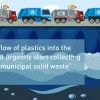This week, OSHA has announced events to highlight worker health and safety initiatives through its Safe + Sound Week. While safety is a cornerstone value for us every week, the American Chemistry Council’s Center for the Polyurethanes Industry (CPI) is excited for the opportunity to highlight our commitment to safety and some of the ways we […]

Marine litter: Let’s stay focused on solutions
Earlier this week I had the privilege of speaking at the German Mission during the United Nations’ “The Oceans Conference.” The conference was designed to advance implementation of Sustainable Development Goal 14 to conserve and sustainably use our oceans, seas, and marine resources. And this obviously includes our shared goal of keeping plastics out of […]
Proposed marine debris legislation helps fortify industry’s ongoing work
On March 29 Senators Sullivan (R-AK), Whitehouse (D-RI) and Booker (D-NJ) introduced the bipartisan Saving Our Seas Act, which also included Senators Coons (D-DE), Inhofe (R-OK), Murkowski (R-AK), Peters (D-MI) and Tillis (R-NC) as cosponsors. In addition to reauthorizing National Oceanic and Atmospheric Administration’s (NOAA) Marine Debris research program, the bill underscores the need for […]

Connecticut launches statewide campaign to increase plastic film recycling
On Tuesday, the Wrap Recycling Action Program (WRAP), in partnership with the Connecticut Department of Energy & Environment Protection (DEEP) kicked off a statewide awareness campaign to increase the recycling of plastic wraps, bags and film packaging (collectively known as plastic film). A recent statewide survey showed why this CT WRAP campaign is so important: […]
The key to building energy efficiency? A sound building envelope
Spray polyurethane foam (SPF) insulation can increase the energy-efficiency of a home by creating a sound building envelope, which shields the home’s living areas from the outdoor environment. Homes can lose as much as 40 percent of heating and cooling energy through cracks and gaps in the building envelope. SPF acts as an effective barrier […]
Restricting POPs: Why the Stockholm Convention matters
Over a decade ago, more than 150 countries signed the Stockholm Convention on Persistent Organic Pollutants (POPs), a global treaty to manage chemical substances that warrant global control due to their PBT (persistence, toxicity, bioaccumulation) characteristics and ability for long-range environmental transport. This treaty is considered a significant environmental agreement, and is broadly supported by […]
Spray foam insulation brings ambitious sustainability goals within reach
In September, California Governor Jerry Brown signed ambitious climate change legislation that set an even higher bar than previous laws – California would now have to reduce greenhouse gas emissions to 40% below 1990 levels by 2030. This integrated plan to address climate change includes doubling energy efficiency savings at existing buildings. Along with other […]
Lautenberg Chemical Safety Act (LCSA): Legislative Summit provides valuable forum to explore new, better way to regulate chemicals in commerce
As a part of their mission to strengthen state governments, the National Council of State Legislators hosted their annual Legislative Summit this week in Chicago. Given the recent federal action around TSCA reform, the summit could not have come at a more opportune time. During the event the American Chemistry Council’s (ACC) Vice-President of State […]
Our tiny house hits the road with a big message on energy efficiency
Last year our Plastics Make it Possible® campaign built a tiny house to demonstrate the role plastic building materials play in increasing energy efficiency. We unveiled the house at the California Science Center in LA, where more than 25,000 visitors saw it firsthand. This year, we decided to take a road trip and took the […]
Plastics reduce environmental cost by nearly four times compared to alternative materials
The results of a new study are disrupting “conventional wisdom” about the sustainability of plastics. The study, conducted by Trucost, found that the environmental costs of using plastics in packaging and consumer goods is nearly four times less than they would be if plastics were replaced with alternative materials. While the environmental costs to produce […]
- On the road with #ACCaugust - 2015
- Chemicals in food: Top chemical food myths debunked…naturally! [video]
- Nanotechnology could be the next big thing in medical care
- Fueling Export Growth (Part 2 of 2): Why the expected surge in U.S. chemicals exports will depend on our country’s ability to deliver on its ambitious trade agenda
- Fueling Export Growth (Part 1 of 2): U.S. chemical exports linked to natural gas could double by 2030; plastics products leading the surge
- Product stewardship helps keep workers ‘Safe + Sound’ June 14, 2017
-
 Marine litter: Let’s stay focused on solutions
June 13, 2017
Marine litter: Let’s stay focused on solutions
June 13, 2017
-
 Neocon: Spotlight on high performing materials in interior design
June 12, 2017
Neocon: Spotlight on high performing materials in interior design
June 12, 2017




